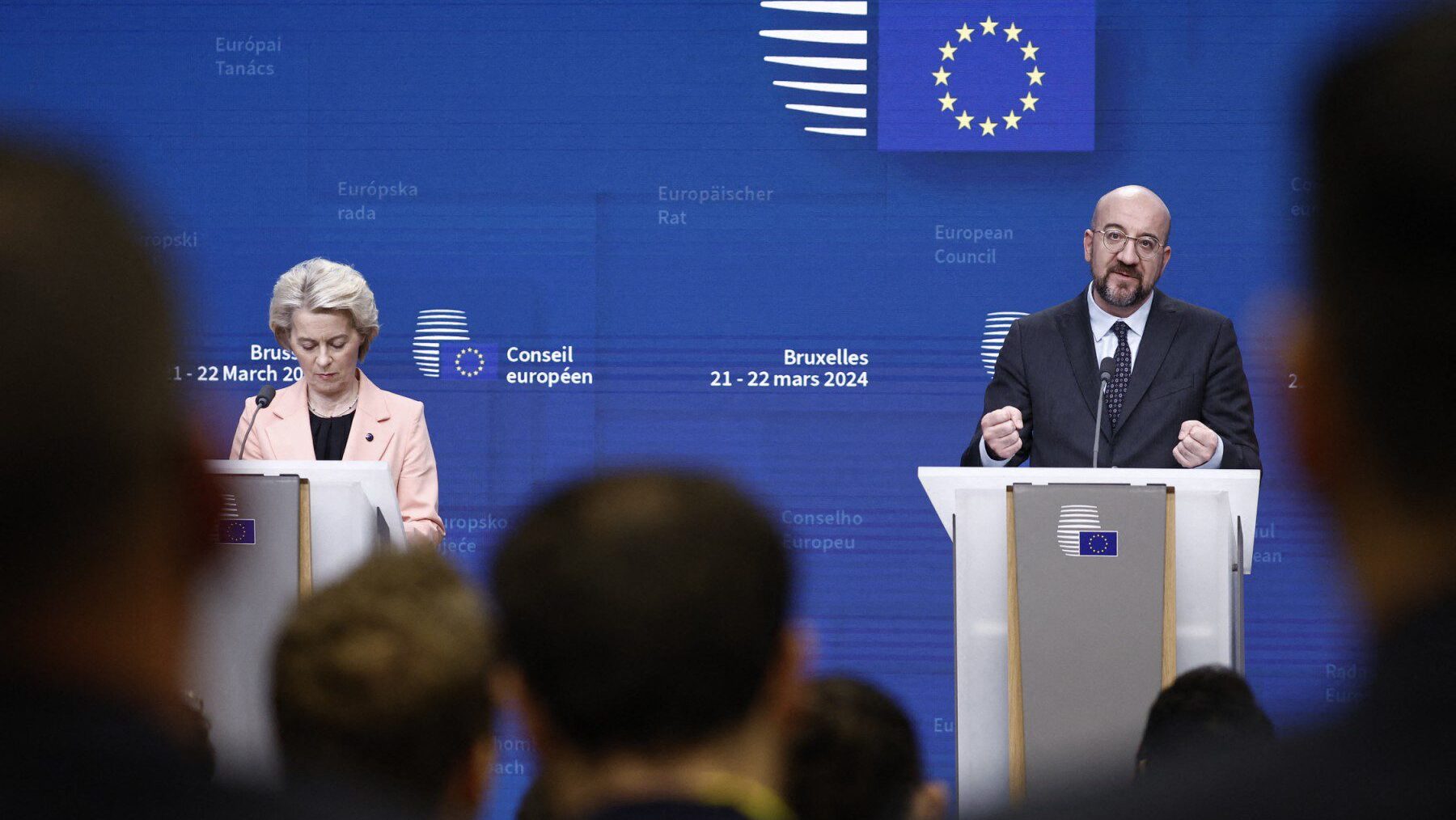
President of the European Commission Ursula von der Leyen and President of the European Council Charles Michel give a press conference at the end of the first day of an EU summit in Brussels, on March 21st, 2024.
Photo: KENZO TRIBOUILLARD / AFP
On Thursday, all 27 of the EU’s heads of government opened the door for Bosnia and Herzegovina to join the bloc.
“Your place is in our European family,” European Council President Charles Michel said on X.
“Today’s decision is a key step forward on your EU path. Now the hard work needs to continue so Bosnia and Herzegovina steadily advances, as your people want,” he added.
The European Council has just decided to open accession negotiations with Bosnia and Herzegovina. Congratulations!
— Charles Michel (@CharlesMichel) March 21, 2024
Your place is in our European family.
Today’s decision is a key step forward on your EU path. Now the hard work needs to continue so Bosnia and Herzegovina… pic.twitter.com/LyotNa5gGc
The decision was immediately welcomed by Borjana Krišto, Chair of the Council of Ministers of Bosnia and Herzegovina.
“Mutual determination and effort have resulted in achieving the necessary level of compliance with the requirements and criteria. We remain strongly determined to continue the work that will result in further progress and development of Bosnia & Herzegovina,” she added.
On behalf of the Council of Ministers of Bosnia and Herzegovina, as well as on my own behalf, I sincerely thank @EUCouncil and @CharlesMichel for tonight's decision to open accession negotiations for 🇧🇦 to join the 🇪🇺. pic.twitter.com/rKAYmBSJkj
— Borjana Krišto (@KristoBorjana) March 21, 2024
The Western Balkan country first applied for EU membership eight years ago. Bosnia and Herzegovina is one of five Western Balkan countries recognized as official candidates to join the EU. It was the only one of those yet to enter formal accession negotiations.
In the intervening years it had, according to a European Commission statement, made sufficient progress in aligning with the bloc’s standards, values, and foreign policy to enter into negotiations.
Before these can start, however, Sarajevo still has to make more changes.
The leaders demanded that the Balkan nation introduce judicial reforms, as well as measures to fight corruption and organized crime.
Meanwhile, on Thursday the Moldovan Parliament officially endorsed the nation (an ex-Soviet state) joining the EU bloc. However, this happened only after the opposition, the Bloc of Communists and Socialists sympathetic to Moscow, had walked out of the vote.
The parliament adopted by a vote of 54-to-0 a declaration saying, “Only joining Europe can ensure the future of the country as a sovereign, neutral and full-fledged democratic state,” in what can be read as an implicit reference to Russia’s alleged expansionist ambitions, which would include (parts of) Moldova.
Earlier, Moldovan President Maia Sandu had called for a referendum on EU membership to be held this year.
A vociferous critic of Russia’s war in Ukraine, she has frequently pointed to Russia as being the biggest threat to Moldova’s security. While Moldova enjoys a 30-year partnership with the NATO military alliance, it is not a member, and thus has no guarantee NATO will come to its aid should it come under attack.
Fears that Moldova might become the next flashpoint inviting Russian military intervention have recently become more acute.
In Transnistria, a piece of territory that broke away from Moldova in the wake of the Soviet Union’s implosion, self-proclaimed President Vadim Krasnoselsky upped the ante, calling on Moldovan authorities to recognize that territory as independent—a parallel with the largely ethnic Russian Donetsk and Lugansk separatist regions in the far-east of Ukraine.
“There is no other way out,” Krasnoelsky said on local television. “There can be no more talk of autonomy. You must walk away from these territories.”
Though heavily dependent on Russia for financial support, Transnistria has no international recognition, not even from Moscow.
In January, Moldovan authorities imposed customs duties on all goods entering and leaving the region, causing Transnistria’s elected officials to appeal to Moscow to throw its weight behind diplomatic efforts to protect the region.
For these and other reasons, Moldovan-Russian relations are at the lowest point in decades.
In the past week, authorities summoned the Russian ambassador twice over Moscow’s decision to open six polling stations in the enclave for Russia’s presidential election, while a Russian diplomat was told to leave the country before March 27th.
Another headache for Moldova has cropped up in the south, as now a second region, Gagauzia, is seeking rapprochement with Moscow.
Despite having met with Russian President Vladimir Putin this month (which would have been seen by the Moldovan government as implicit approval of Russia’s actions in Ukraine), its leader, Yevgenia Gutsul, has said the region, while it does want (more) autonomy, does not seek outright secession.
